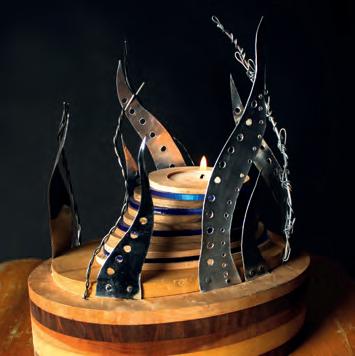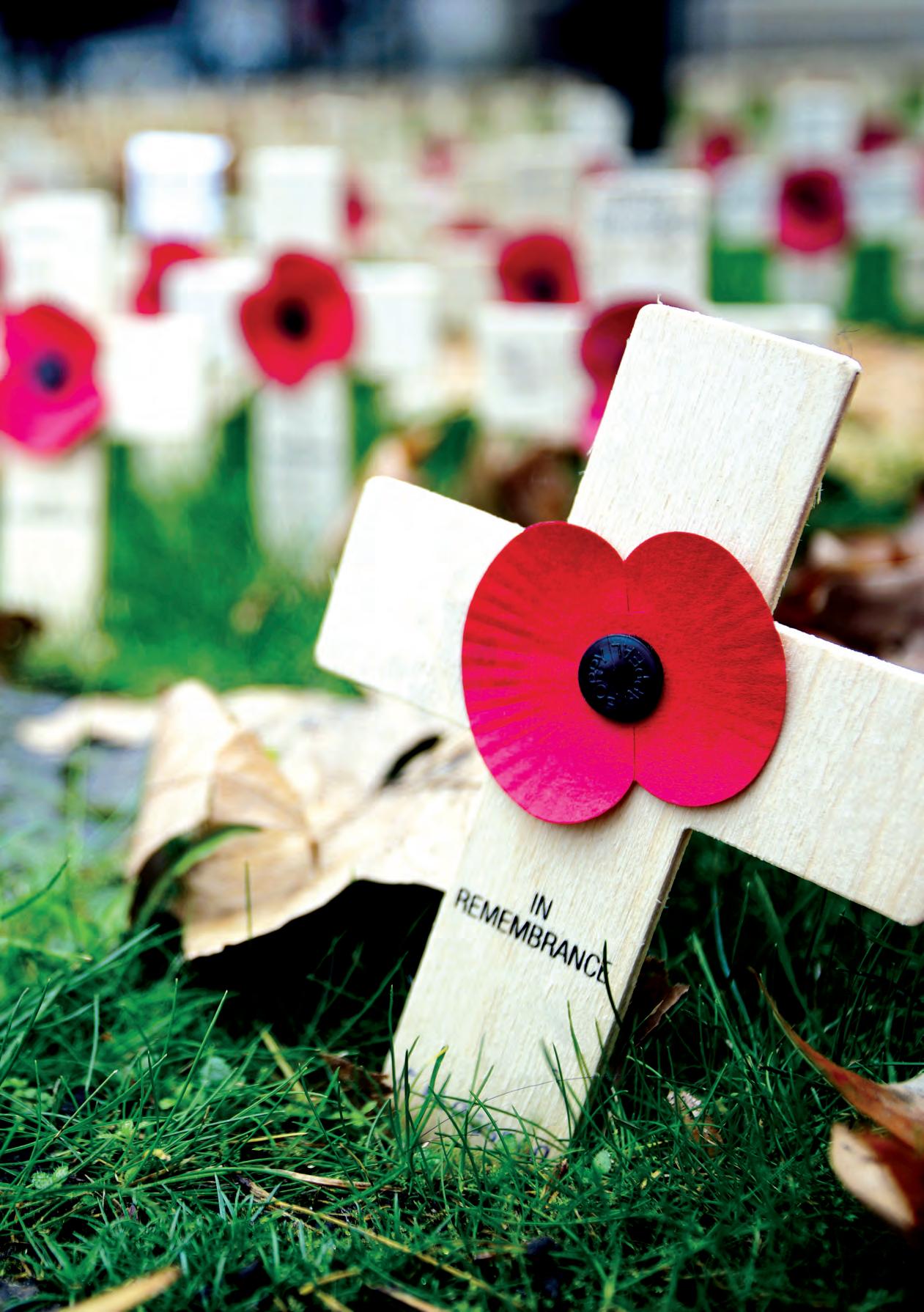
6 minute read
The Arts
CREATIVITY AND 3D DESIGN
To ensure the girls who are considering which GCSE subjects to choose are given an idea of everything that’s on offer, we operate a ‘creative carousel’ in L5, where they experience all the creative topics to get a true feel for the subject. George Greed, Teacher of 3D Design, gives us an insight into this creative area.
Whether it’s emerging from the sparks and flames of a welding and brazing workshop, seeing the digital model you’ve worked on finally get 3D printed, or sitting quietly sketching your next big idea; 3D Design offers a diverse, creative and challenging course.
I’ve always had a fascination with how things are made; exploring how I can take a few simple materials and turn them into something that serves a genuine purpose in my life. However, finding joy and satisfaction in the making process, regardless of outcome, is probably the part of design I enjoy the most. It is this curiosity and exploration of the creative journey that I want to foster in the pupils here; lighting the spark and equipping them with an attitude that can carry the girls in any direction.
Day to day, there is a focus on practical experiences and building a diverse understanding of design in the broadest sense. In the workshops and design studio, pupils are always busy exploring product design, jewellery, architecture and more. They get the opportunity to utilise the wealth of specialist tools and equipment we have as a School, and then see their design ideas come to life using traditional and more modern materials. The Department also embraces the School’s digital strategy, having moved to cloud-based CAD software and extensive use of OneNote, to allow work to continue even when not in the classroom.

At GCSE, the ‘Lamps and Lighting’ project we run is a great example of the diversity of ideas that are generated, with girls working to the brief across woods, metals and plastics. The outcomes are strikingly different, yet at their core, all play with ideas of transparency and shadow. Something particularly exciting is when a pupil chooses to tackle a material area that we don’t commonly teach. Ekaterina Zharikova (U5) was inspired by resin sculptures she had seen, so set about learning the skills necessary to mould and cast crystals out of resin to adorn the top of her lamp. This trial and error approach proved successful and the knock-on effect was other pupils pushing the boundaries of what they can achieve.
This pupil-led approach is key to our offering, as the girls benefit from developing their independence across the years. Starting with more structure to build skills and confidence, projects in the youngest year groups include plastic keyrings, wooden desk storage and metal garden ornaments. Further up the School, we then become facilitators as pupils work with more control of their direction.
3D Design isn’t all about making though, and there is a wealth of transferable skills that naturally find their way into the flow of a project. Clear written, visual and verbal communication is developed as the girls document their work and share ideas with teachers and the class. The general workflow improves their discipline and organisation, as well as logical problemsolving as pupils get to crossroads and need to work out their next steps, drawing on all the knowledge they’ve gathered. There are cross-curricular links to Maths and Science too, such as the understanding of material properties, working knowledge of forces, and a grasp of Maths for shapes, marking out and costing.
I am continually impressed by the output and attitude of our pupils here at Sherborne Girls, taking pride in the work they produce and understanding its value. I hope we are able to open our doors in the near future and exhibit some of their fantastic work, giving it an opportunity to be seen and appreciated by a wider audience.
George Greed, Teacher of Art, Design and Technology
IN THE RECORDING STUDIO…
Whilst the School undertook its remote schooling programme during the Trinity Term, The Merritt Centre wasn’t entirely empty. Just one example of how the facilities were put to good use was when pianist, Duncan Honeybourne, recorded a CD from The Merritt Centre’s Gransden Hall and recording studio.
Duncan compiled ‘Contemporary Piano Soundbites’ during the first lockdown. The resulting CD contains a collection of solo piano miniatures by various musicians, including the Music Department’s very own Simon Clarkson who wrote: ‘The singing will never be done’.
The project has already raised well over £2000 for the Help Musicians UK Coronavirus Hardship Fund, supporting musicians struggling in the current situation.
Duncan, who has toured extensively as a soloist and chamber musician, has frequently played for the BBC and radio networks worldwide and is a Tutor of Piano at the University of Southampton, added:
“I’m most grateful to Sherborne Girls wonderful Music Department for playing such a crucial part in bringing the whole project to fruition.”
SUSTAINABLE FASHION

As an A Level Textiles student, I wanted to link my Extended Project Qualification (EPQ), with a core aspect of my A Level work and a course that I feel very strongly about.
I focused on the upcycling of denim throughout my garments. Denim production has been viewed as part of the ‘fast-fashion’ segment of the fashion industry. There is also the hugely damaging contributions to the planet due to excessive water usage during cotton production and dyeing processes.
I explored this concept further during my lecture, explaining the production and design process I went through for each garment. I also wished to make people aware of society’s long-instilled shopping habits based on excessive purchasing which encourages the increase in the mass production of fast-fashion items, and how we need to change and take a brief moment to stop and think whether it is a necessity for us to buy that next new line of clothing.
I loved organising the fashion show and everyone seemed to enjoy being part of it – I think it’s made a few of us think twice and question whether we need to buy new clothes. Serena Clinch (U6)




ECHOES By Parker MacRae (U5)

Congratulations to Parker MacRae whose poem, Echoes, was awarded first place in the Teens (12-18) Poetry Category competition run by BBC Jersey celebrating the 75th anniversary of the liberation of Jersey. To mark Remembrance Day, she read it to her whole house in an assembly. Well Done Parker!
Quiet Is the street of a Town once bustling with People, thoughts, memories.
Panicked Is the woman at The checkout, serving Businesses, friends, families.
Fearful Is the tired mother, Who is holding close Children, food, medicine.
Coughing Is an elder Woman, yet she is Avoided, scared, lonesome.
Begging Is the student Who seems to be Penniless, stressed, famished.
Quiet Is the town once full Of joy, empty of Residents, laughter, sound.
Panicked Is the teenage boy Listening to a Radio, contraband. Fearful Is his mother who Seeks for her children’s Freedom, liberation, life.
Coughing Is the baby in the Cot, a child without Hope, safety, stability.
Begging Are the slaves, ripped from Their homes, yearning for Liberty, home, some food.
Loud Are streets with bunting, Brimming with those who Frolick, celebrate, sing.
Calm Are the mothers who know their families are Safe, free, liberated.
Fearless Are gleeful children Who once again play In parks, squares, and sunny streets.
Grateful Are the people of Jersey who delight In their bright new future.
Freedom Is clinging in the air, The past echoes And we’ll feel free again.










